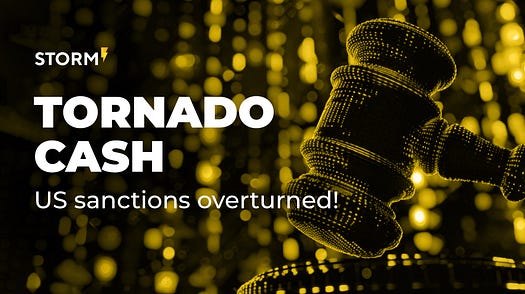
Tornado Cash has US sanctions overturned!

The 5th Cir. Court of Appeals has ruled that the U.S. Treasury overstepped its authority when sanctioning the cryptocurrency mixer “Tornado Cash” back in August 2022.
Background:
- In 2022, the US Treasury Department ruled that cryptocurrency mixer, Tornado Cash, had helped launder $7 billion for North Korean hackers and other malicious cyber actors.
- On the 26th of November 2024, a three-judge panel of the New Orleans based 5th US Circuit Court of Appeals overturned the Treasury’s sanction against Tornado Cash after six users in September 2022 filed a lawsuit contesting the Treasury’s authority to sanction the cryptocurrency mixer — This lawsuit was supplied with financial backing from Coinbase!
What is Tornado Cash and how do cryptocurrency mixers operate:
Tornado Cash, which was established in 2019, is a decentralized cryptocurrency mixer for Ethereum that is designed to enhance transaction privacy by obfuscating both the origins, and the destinations of digital assets.
Cryptocurrency mixers operate under these Four steps:
1) Deposit: Users send their cryptocurrency (e.g., Bitcoin, Ethereum) to the mixer.
2) Mixing Pool: The mixer aggregates the deposited funds from multiple users into a single pool, effectively ‘mixing’ the coins.
3) Redistribution: The service sends the equivalent amount (minus the fee) back to the user or to a different wallet address, using coins from the pool that are not directly linked to the original deposit.
4) Breaks Traceability: By blending coins from many sources, the trail of ownership becomes incredibly difficult to track on the blockchain.
The court ruled that Tornado Cash’s immutable smart contracts do not constitute or qualify as ‘property’ under the International Emergency Economic Powers Act (IEEPA), thereby placing them beyond the Treasury’s sanctioning power. An immutable smart contract, once deployed on a decentralized blockchain, becomes unchangeable, cannot be removed, and is no longer under anyone’s control. The court emphasized that ‘property’ must be understood in the context where something can be owned or controlled. Tornado’s immutable smart contracts couldn’t qualify under this distinction because they cannot be owned or controlled by anyone; even by the original developers.
The Courts Key Findings:
Immutable Nature of Smart Contracts: These smart contracts were created through a process involving over a thousand volunteers in a “trusted setup ceremony.” This process ensured that the code could not be updated, removed, or controlled by anyone, making the contracts unchangeable and open for anyone to use.
Lack of Ownership or Control: Since no one can exclude others from using these contracts, they cannot be considered “property.” Even under sanctions, these smart contracts continue to operate autonomously, allowing anyone, including sanctioned parties, to access them.
OFAC’s Arguments Rejected: The court found that OFAC’s definitions of ‘property,’ ‘contracts,’ and ‘services’ do not apply to these smart contracts:
- Not Property: They are not ownable, meaning no one holds rights over them.
- Not Services: The contracts do not involve human effort; they function as tools rather than active services.
Implications for Users: Due to these contracts being autonomous and public, they can be used without a recipient’s knowledge or consent. This creates a risk of liability for individuals who unknowingly receive digital assets through Tornado Cash, which the court highlighted as a problematic outcome of the sanctions.
Conclusion:
The court ruled that these smart contracts cannot be sanctioned under federal law because they are not property or services. Furthermore, OFAC cannot use its discretion to block them since the law does not support such actions. This decision emphasizes the unique legal challenges posed by decentralized, immutable blockchain technologies.
What do people have to say:
The Crypto industry largely cheered the ruling with Coinbase chief legal officer, Paul Grewal, taking to Platform X to call it a ‘historic win for crypto and all who cares about defending liberty.’
Consensus Senior Counsel Bill Hughes also took to Platform X to call it a ‘good win’ but clarified that it doesn’t mean Tornado Cash is completely in the clear, emphasizing that the issue just pertained to smart contracts without admin keys.
An important caveat to this ruling and its limitations:
- This ruling is incredibly significant in protecting the liberty of cryptocurrency; however, it is likely not to be the final word on the matter. The 11th Circuit is expected to weigh in on a similar case involving Tornado Cash, which is currently pending. Additionally, Congress might determine that this matter requires greater clarity and choose to amend the IEEPA, which was originally passed during the Carter administration.
- The ruling does not apply to mutable smart contracts, which are still under human or organizational control. This creates a potentially wide exception based on the specific categorization of smart contracts, which could lead to further legal challenges or court cases in the future.
- Additionally, the decision does not eliminate the possibility of sanctions or criminal charges for individuals who use cryptocurrency, mixers, or similar tools to evade sanctions or launder money. For example, the Van Loon case still upholds sanctions against the founders of Tornado Cash.
- Beyond immutable smart contracts, the case preserves the broader sanctions framework that prohibits transactions involving sanctioned entities, including mixers, cryptocurrency exchanges, and other related parties. Unless OFAC explicitly removes a designation, parties must assume that all prohibitions remain in place to stay compliant.
- The Treasury Department may choose to appeal this decision. Meanwhile, a parallel challenge to OFAC’s designation of Tornado Cash is ongoing in the 11th Circuit, where the district court supported OFAC’s authority. A split between circuit courts could potentially bring the issue to the Supreme Court’s attention.
- For cryptocurrency and DeFi businesses, the ruling offers some legal clarity and protection against the sweeping application of sanctions laws to autonomous, immutable, and decentralized protocols. However, these companies must remain mindful of the decision’s limitations when structuring their transactions to ensure compliance.
In summary, the 5th Circuit’s decision marks an important moment in the regulation of decentralized technologies. It underscores the need for clear and updated legal frameworks to address the complexities of these innovations while balancing privacy and security concerns in the digital era.



.svg)

.svg)


